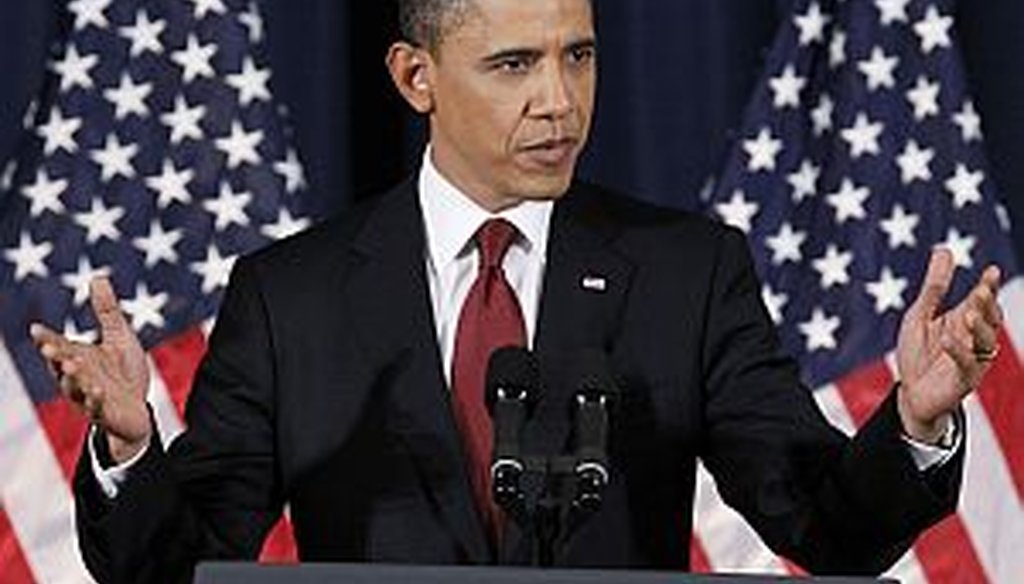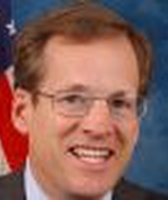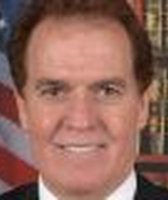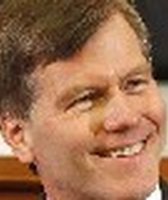Stand up for the facts!
Our only agenda is to publish the truth so you can be an informed participant in democracy.
We need your help.
I would like to contribute

President Obama speaks on Libya last week at the National Defense University in Washington, DC
Between the national debt, the nuclear crisis in Japan, labor unrest and U.S. intervention in Libya, current events give us plenty of reasons to lose sleep.
Rest assured. Like the trustiest of night lights, the Truth-O-Meter is here to comfort you. Last week, it sussed out the truth on statements about all those subjects.
And if you’re losing sleep over lost sleep -- well, knock it off. The Truth-O-Meter found that lost sleep can be hazardous to your health.
Want to comment on our findings? Go to our Facebook page and hit the "like" button to join the discussion. You can also follow us on Twitter.
Consumer Reports senior editor Joel Keehn: The hour of sleep you lose during the change to daylight saving time might initially pose some health risks.
Earlier this month, Joel Keehn, a senior editor at Consumer Reports Health Blog, made the above comment about daylight saving time.
Losing an hour of sleep is certainly annoying. But does it really put people in harm’s way?
Many studies on a range of topics including mining accidents, heart attacks and traffic crashes on the Monday after the time switch support Keehn’s position. As a bonus, his blog post included studies that show some benefits, and he used careful language to describe the phenomenon.
We find Keehn’s statement True.
Young Americans for Liberty: "Every taxpayer owes about $130,000 to pay off the national debt."
Young Americans for Liberty, a group of college students worried about the growing $14 trillion federal debt, thinks Congress just doesn’t get it.
Its Clayton State University chapter offered the above statistic in a news release.
Young Americans for Liberty used figures from a group that had most of its numbers right, but the Internal Reveue Service has different figures on the number of U.S. taxpayers. It also made its calculations based on the larger of two widely used debt measures, but both figures are valid. This claim rates as Mostly True.
Calvine Rollins, president of the Georgia Association of Educators: Georgia public sector employees do not have a say in the conditions of their employment, do not have bargaining rights or a say in their working conditions.
In Georgia, protesters aren’t sleeping in the state Capitol, as was the case in Wisconsin’s battle over labor rights. But there has been some discussion.
A recent op-ed by Rollins in The Atlanta Journal-Constitution made the above statement.
A 1973 opinion from the attorney general’s office does give employees an avenue to discuss the conditions of their employment. But state and local governments do not have to engage in collective bargaining.
Experts disagreed with Rollins about whether public sector employees have a say in working conditions. They can speak out, but they do have limited influence.
One part of her statement was correct. The other two had holes. Barely True.
Flip-O-Meter: Potential presidential candidate Newt Gingrich and President Barack Obama on intervening in Libya.
Some four years ago, Obama told a journalist that "the president does not have power under the Constitution to unilaterally authorize a military attack in a situation that does not involve stopping an actual or imminent threat to the nation." This month, he bombed Libya.
Before the intervention, Gingrich said that if he were in charge, he would implement a no-fly zone over Libya "this evening." Once Obama did, Gingrich said he "would not have intervened." He later posted on Facebook that those two opinions were consistent.
Did they flip-flop?
In 2007, Obama was adamant that the president did not have the power to authorize an attack if there was no imminent threat to the U.S. But now he has authorized just such an action.
Gingrich’s Facebook post was unpersuasive.
Full Flop for both Obama and Gingrich.
U.S. Sen. Johnny Isakson: "There has never been a death caused by a [nuclear] reactor in the United States, even when Three Mile Island failed in the 1970s."
When a deadly earthquake and tsunami triggered a recent disaster at a Japanese nuclear power plant, a few residents near Georgia’s Vogtle nuclear power plant, the planned site of the nation’s first new reactors in decades, began to ask questions.
Isakson made the above statement in a YouTube.com video to reassure them.
Experts agree that no one died during the immediate crisis surrounding the 1979 Three Mile Island nuclear plant disaster or in other commercial U.S. plants as a result of operations. The prevailing view is that in the decades following Three Mile Island, no deaths have been tied to illnesses resulting from radiation exposure.
But the latest research says it is possible that some have died from cancer. It’s also worth noting that some scientists think it increased overall cancer deaths.
True.
Our Sources
See original stories.























































